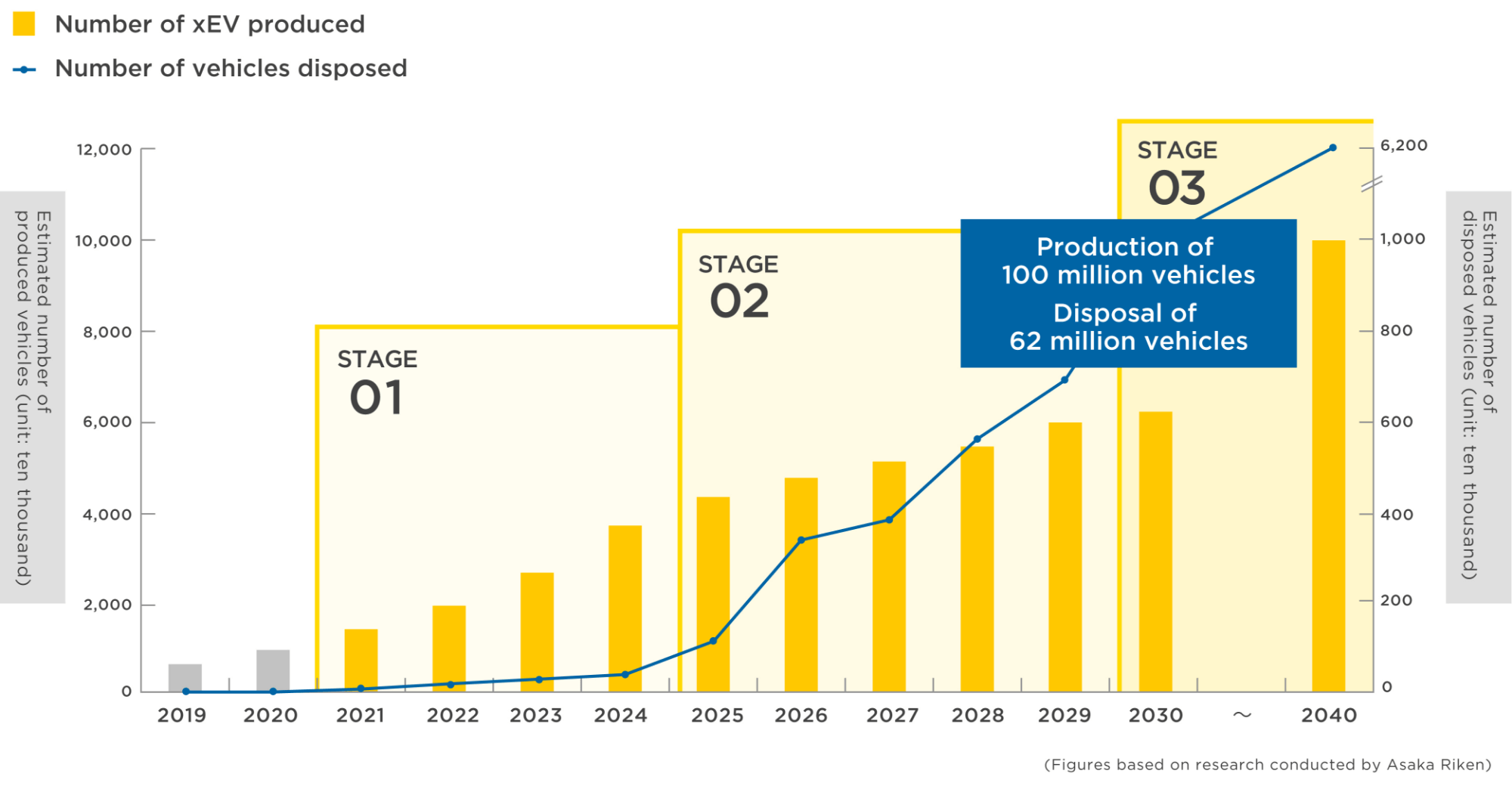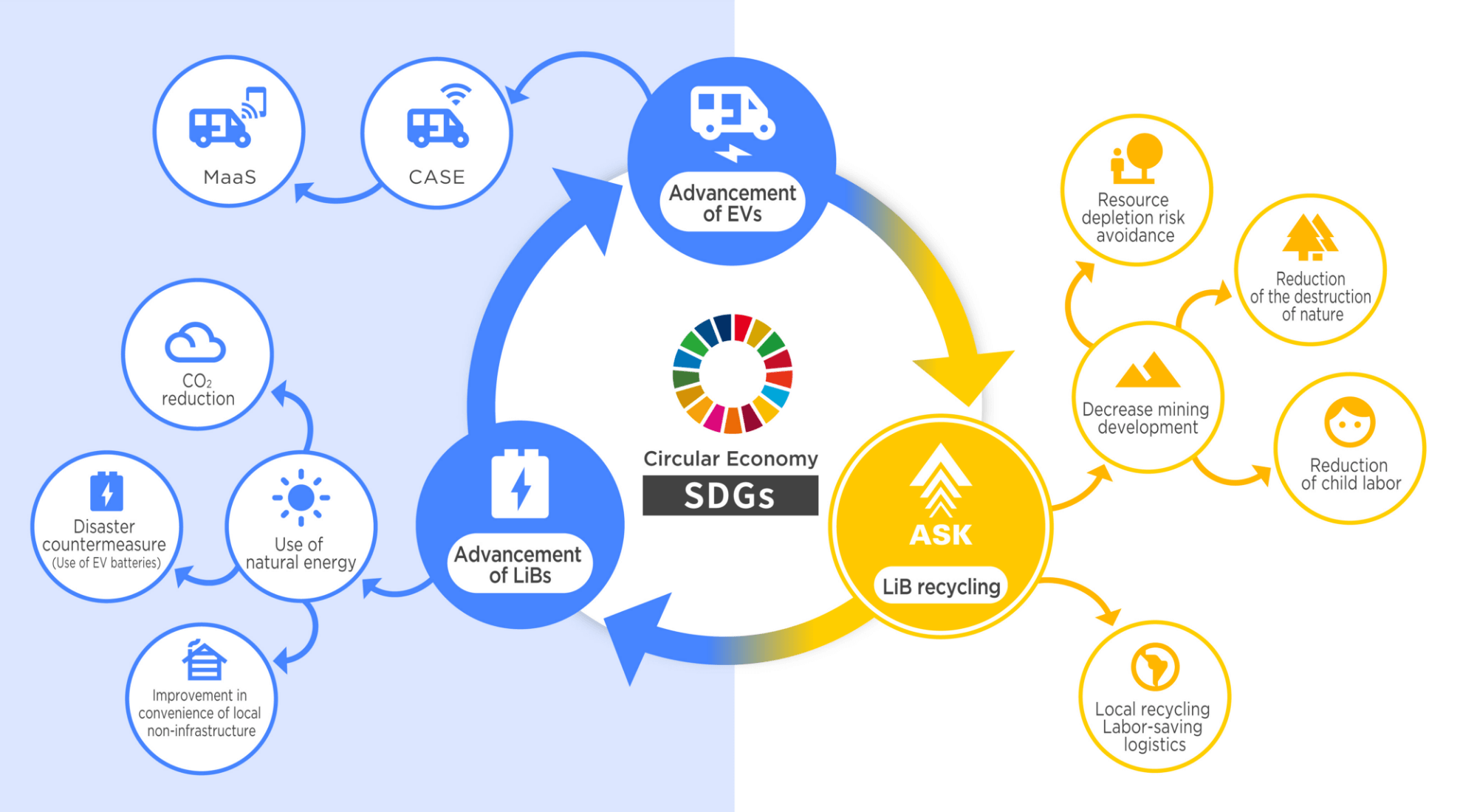
LiB Recycling Business
Minor Metals Business of Asaka Riken.
A New Pillar of Asaka Riken.
Explosive Growth of the LiB Market
Lithium-ion batteries (LiB) are quintessential for next-gen vehicles, such as hybrid and electric cars, as well as smartphones and other advanced devices that enrich our lives. In particular, the LiB market has been expanding rapidly as next-gen vehicles increase in popularity as the world trend more toward a decarbonized society.
However, there are environmental impacts and social issues related to the procurement and mining of minor metals used for LiBs and other advanced devices. Taking advantage of the technology we have cultivated over the past half century, Asaka Riken entered the minor metal business in 2013 and the LiB recycling business in 2019. We will take on every challenge with the aim of quickly realizing "LiB to LiB" where minor metals are recycled from used LiBs and used as materials for new LiBs.
-
Global Challenges of Minor Metals
-

-
Minor metals are quintessential resource for next-gen vehicles, IT products, and cogeneration systems and other environmentally-friendly and energy-saving products.
Due to the small reserves, these nonferrous metals are technically and economically difficult to extract, and their stable supply require a governmental level management. Minor metals are highly unevenly distributed, with countries such as China, Indonesia, and South Africa accounting for a high share with Japan having no choice but to procure them through imports.
In addition, cobalt, nickel, and lithium, the three main raw materials for LiB, are expected to run into short supply by 2025. Amid fears of depletion, competition to secure resources is intensifying and stable resource procurement is becoming a global challenge.
-
Rapid Popularization of Next-Gen Vehicles
-

-
Production of next-gen vehicles such as hybrid and electric vehicles, which are expected to spread rapidly in anticipation of a decarbonized society and exceed 100 million units in 2040.
In contrast, the number of vehicles which will be disposed is expected to increase sharply from around 2025 and exceed 60 million units by 2040, raising a new issue related to the rapid spread of next-gen vehicles.
Why Enter LiB Recycling Business?
In response to the new framework for reducing GHG emissions established in the Paris Agreement of 2015, various emission reduction efforts, such as promoting electric vehicles and other next-gen vehicles, are being made around the world. The EU is considering the introduction of new regulations that will demand the submission of carbon footprints and the use of recycled materials above a certain level for LiB used in such vehicles as a major step forward.
However, issues including the uneven distribution and depletion of resources, destruction of nature due to excessive mining, labor problems in producing countries, and disposal methods remain.
Why did Asaka Riken decide to enter the LiB recycling business? We wanted to contribute to solving these issues by realizing "LiB to LiB" and creating a stable resource recycling process within countries and region and make major contribution to the sustainability of people and the Earth.

-
Achieving "LiB to LiB" in
Cooperation with Business Partners -

-
It is essential to establish a system in which the "arterial industry" that manufactures LiB and the "venous industry" that recycles minor metals from used LiB work together as one. To this end, we are seeking alliances with business partners.
In August 2021, we concluded a joint research and development agreement with TOHO ZINC Co., Ltd. as the first step. Although we are proud of our high recovery rate of minor metals through hydrometallurgy, we have been facing challenges in collecting, disassembling, and pre-processing used LiBs. On the other hand, TOHO ZINC, a company with its strength in pyrometallurgy, was looking for a method to extract and refine minor metals from used LiBs. The contract was concluded as strengths of both companies matched each other.
Both companies having a plant in Iwaki-shi, Fukushima also encouraged this joint research and development.

Realizing "LiB to LiB" in Fukushima
We will promote our LiB recycling business in Fukushima Prefecture where our company was founded. Established in 2014, our Iwaki Plant will serve as a new base for this business.
The Iwaki Plant will contribute to the industrial recovery of the region that sustained tremendous damage by the Great East Japan Earthquake and resulting nuclear disaster. We also aim to build a new resource circulation model.

Story02New Iwaki Plant
Iwaki Plant,
A New Base for LiB Recycling Business.

Asaka Riken and Possibilities of Minor Metals
-

Story01LiB Recycling Business
Minor Metals Business of Asaka Riken.
A New Pillar of Asaka Riken. -

Story02New Iwaki Plant
Iwaki Plant,
A New Base for LiB Recycling Business. -

Story03Local Production and Consumption + Local Regeneration
New Resource Circulation Model
of Asaka Riken





